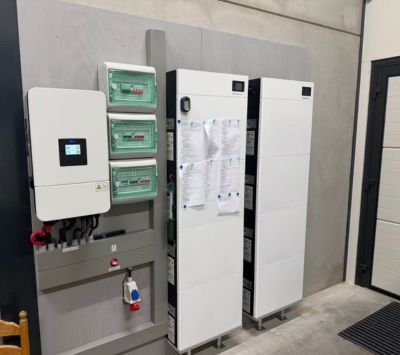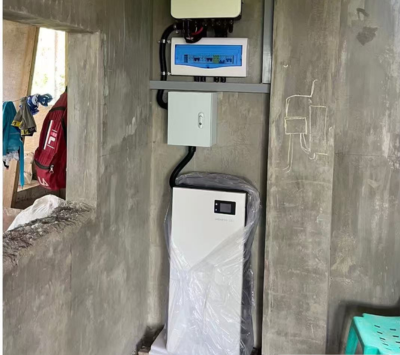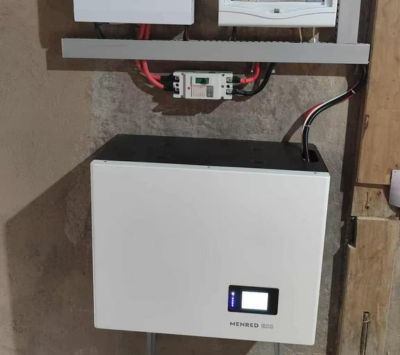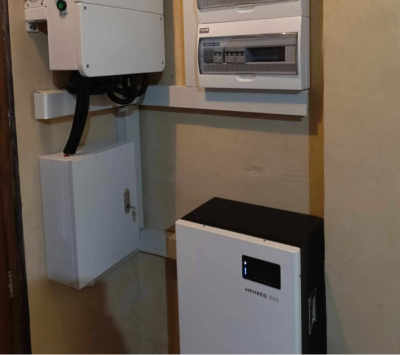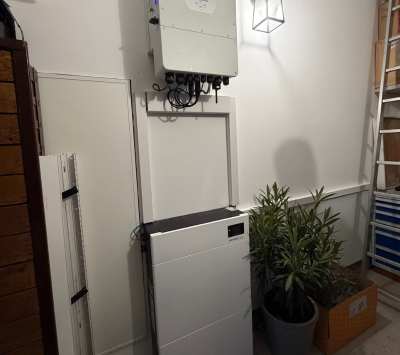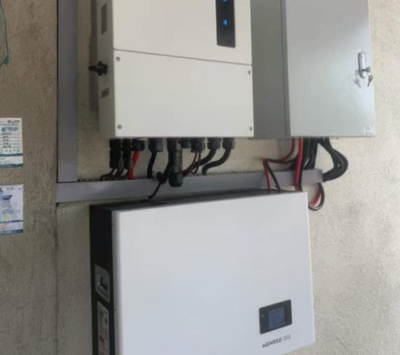1. Introduction
Lithium-ion batteries are foundational to many modern energy solutions, from smartphones and electric vehicles to large-scale solar storage systems. Their exceptional performance stems from a combination of factors that set them apart from traditional battery technologies. This article will expand on four major advantages of lithium-ion batteries, illustrating why they are often the preferred choice in energy storage applications.
2. Case Study: MENRED ESS Home LiFePO4 Battery Installation for Enhanced Solar Energy Storage
In this real-world installation, a residential customer opted for a MENRED ESS home energy storage solution to maximize the benefits of their solar power system. The setup includes three MENRED LFP.6144.W LiFePO4 batteries, each with a capacity of 6.144 kWh, connected in parallel. Together, the system provides a total energy storage capacity of 18.432 kWh. The batteries are paired with a Deye SUN-8K-SG05LP1-EU inverter, creating an efficient and reliable energy storage solution.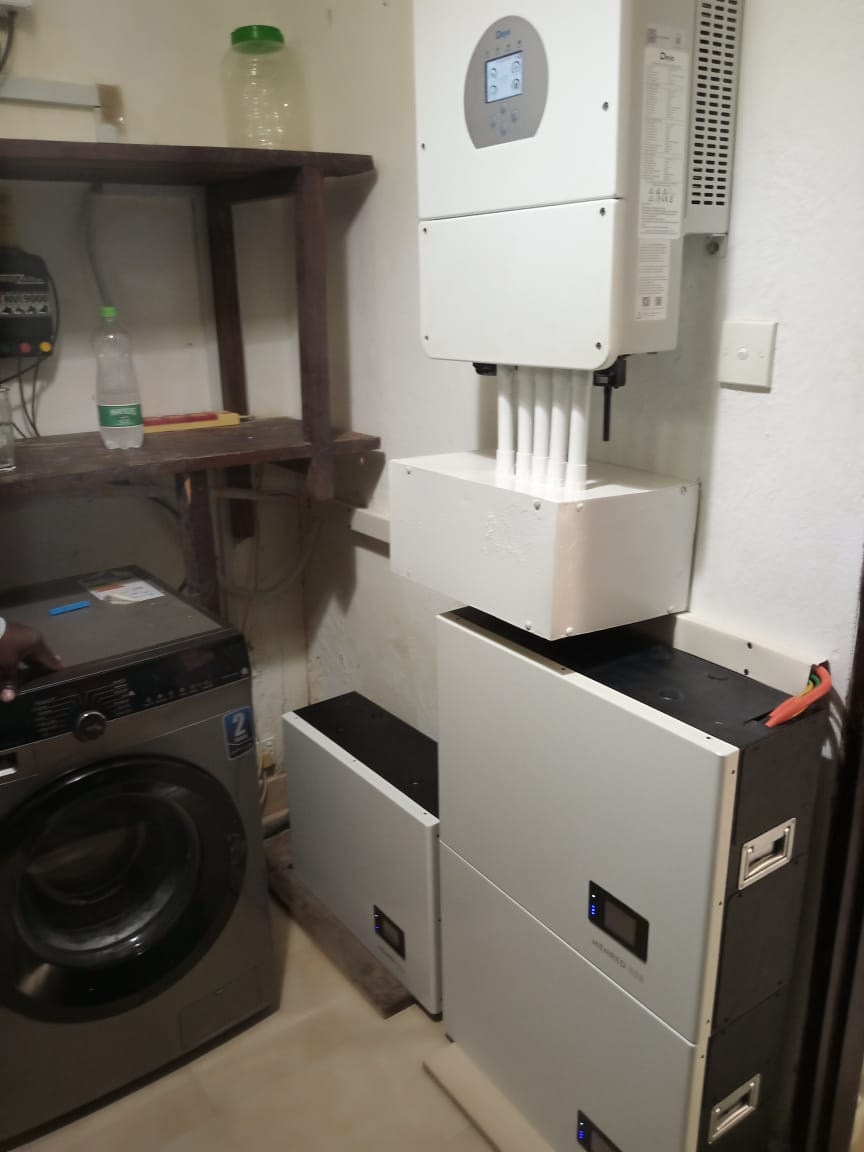
Installation Overview
This installation was designed to support the household’s energy demands while reducing dependence on the grid. The MENRED LFP.6144.W batteries were chosen for their high cycle stability, safety, and compatibility with renewable energy systems. These LiFePO4 batteries are known for their durability, providing thousands of charge and discharge cycles with minimal degradation, ensuring long-term reliability.
The Deye SUN-8K-SG05LP1-EU inverter acts as the system’s heart, efficiently converting the DC power stored in the batteries into usable AC power for the home. Its advanced energy management capabilities allow seamless integration with the customer’s solar panels, optimizing energy usage and ensuring excess solar energy is stored for nighttime or high-demand periods.
Key Advantages of the Installation
- High Storage Capacity: The combined capacity of 18.432 kWh ensures sufficient energy storage for daily household needs, including peak energy demand hours and backup during power outages.
- Scalability: By connecting the batteries in parallel, the customer has the flexibility to scale the system in the future if their energy needs grow.
- Efficiency and Safety: The LiFePO4 battery chemistry is not only highly efficient but also offers superior thermal stability, reducing risks of overheating or fire.
- Grid Independence: This setup allows the customer to store surplus solar energy during the day and use it at night, minimizing electricity bills and grid reliance.
Real-World Benefits
After the installation, the customer reported a noticeable decrease in grid electricity consumption and greater energy independence. The system’s quiet operation and compact design ensured it fit seamlessly into the household environment. Furthermore, the low-maintenance nature of both the MENRED batteries and the Deye inverter offered additional peace of mind, as no regular upkeep is required.
3. High Energy Density
Lithium-ion batteries are particularly known for their high energy density, which refers to the amount of energy they can store relative to their size and weight.
- What It Means: High energy density allows lithium-ion batteries to store more power without taking up as much physical space as other battery types, such as lead-acid or nickel-cadmium. This is due to the chemical properties of lithium, which enable efficient storage and release of energy.
- Application Impact: For solar power systems and portable electronics, this high energy density means devices can run longer between charges. In solar energy applications, lithium-ion batteries store the energy generated during peak sunlight hours for use when the sun is not shining, optimizing power availability and reducing dependence on the main grid.
- Comparison to Other Batteries: Traditional lead-acid batteries, for example, have a much lower energy density, requiring more space and weight to achieve the same energy storage. This can be a significant limitation for residential and commercial settings where space is at a premium. Lithium-ion batteries solve this problem by offering more energy in a smaller footprint, facilitating their integration into tight spaces without compromising power needs.
4. Long Lifespan and High Cycle Stability
Battery lifespan is a crucial factor in the overall cost-effectiveness and reliability of energy storage solutions. Lithium-ion batteries excel in this area with a long service life and excellent cycle stability.
- Defining Lifespan and Cycles: A battery cycle refers to one complete charge and discharge cycle. Lithium-ion batteries are capable of handling more than 6000 cycles while maintaining high efficiency. This cycle stability translates into many years of reliable service, making these batteries an investment that pays off over time.
- Advantages for Solar and Backup Power Systems: For homeowners and businesses using solar panels, the longevity of lithium-ion batteries ensures that they can continuously rely on stored energy without frequent replacements. This leads to a lower total cost of ownership and fewer disruptions to the energy supply. In contrast, lead-acid batteries typically last for only 300–500 cycles before significant degradation, making them less suitable for long-term energy storage.
- Real-Life Example: A household using lithium-ion batteries for solar energy storage can benefit from uninterrupted power during outages or peak demand periods. Unlike older battery technologies, which degrade rapidly, lithium-ion options retain a significant portion of their capacity even after thousands of cycles, ensuring consistent energy availability over many years.
5. Low Maintenance Requirements
A low-maintenance energy storage solution is invaluable, especially for residential users who may not have the expertise or resources to regularly service their energy systems.
- Minimal Upkeep Required: One of the hallmarks of lithium-ion batteries is their minimal maintenance requirement. Unlike lead-acid batteries, which may need regular watering and equalization to balance cell charge levels, lithium-ion batteries are virtually maintenance-free. The built-in Battery Management System (BMS) actively monitors and manages the performance of each cell, ensuring that the battery operates efficiently without manual intervention.
- BMS Role in Optimization: The BMS plays a critical role by protecting against common issues such as overcharging, deep discharge, and overheating. This system autonomously manages the charging and discharging processes, optimizing battery health and performance. For users, this means a “set it and forget it” experience, where the battery can be trusted to operate safely without frequent checks or manual adjustments.
- Benefits for Large-Scale Use: In larger energy storage applications, such as those used in commercial settings, the low maintenance requirement of lithium-ion batteries translates into reduced operational costs and labor. Over the lifespan of the battery, these savings can be substantial, making lithium-ion technology an attractive option for businesses looking to optimize their energy strategies.
6. Environmentally Friendly and Safe
Sustainability and safety are two important considerations in the adoption of energy storage solutions. Lithium-ion batteries score highly in both these areas due to their composition and advanced safety mechanisms.
- Environmental Benefits: Lithium-ion batteries, especially those using lithium iron phosphate (LiFePO4) chemistry, do not contain harmful heavy metals like cadmium or lead, making them safer for disposal and less harmful to the environment. Additionally, the production and recycling processes for these batteries have improved over the years, further enhancing their eco-friendly profile.
- Reduced Emissions and Carbon Footprint: By facilitating the integration of renewable energy sources like solar power, lithium-ion batteries contribute to a reduction in carbon emissions. They enable users to store clean energy and use it during non-peak hours, reducing the overall demand for fossil fuel-based power.
- Built-in Safety Features: The advanced BMS integrated into lithium-ion battery systems provides multiple layers of protection. These include safeguards against overcharging, short circuits, and overheating. The BMS ensures that individual cells within the battery remain balanced, preventing scenarios that could lead to overheating or even battery failure. Such safety mechanisms make lithium-ion batteries a reliable choice for residential and commercial applications.
- Enhanced Design for Stability: Modern lithium-ion batteries are designed with safety in mind. For example, lithium iron phosphate (LiFePO4) batteries are known for their high thermal stability, meaning they are less prone to overheating and do not pose as significant a risk of combustion as some other battery types. This makes them suitable for use in homes and businesses where safety is paramount.
7. Conclusion
The combination of high energy density, long lifespan, low maintenance, and environmental safety makes lithium-ion batteries a standout choice for energy storage. Their advanced technology supports efficient power storage, especially in renewable energy applications like solar systems. With continuous improvements in technology, lithium-ion batteries are poised to remain a cornerstone in sustainable energy solutions, supporting the shift toward cleaner, more reliable power sources.

